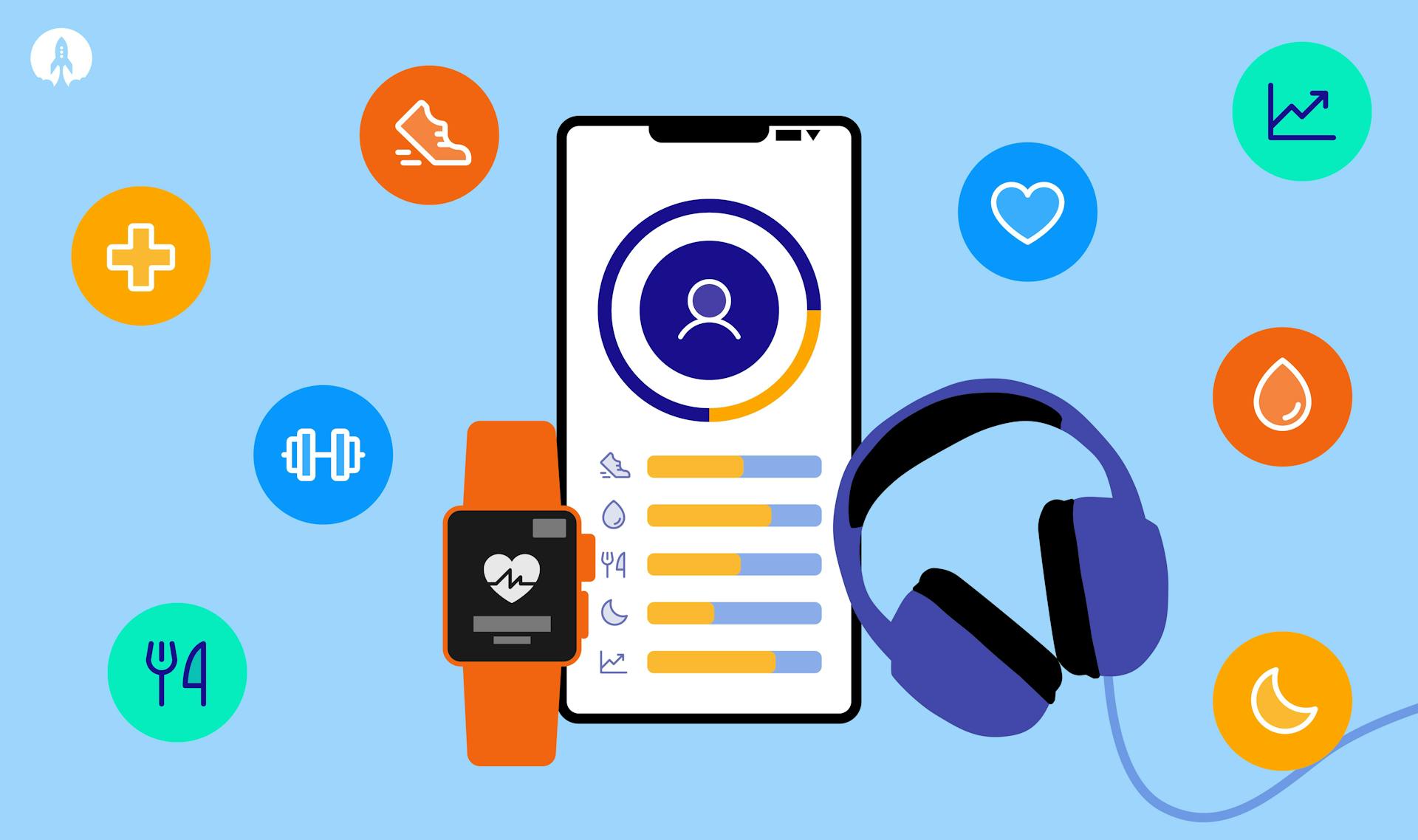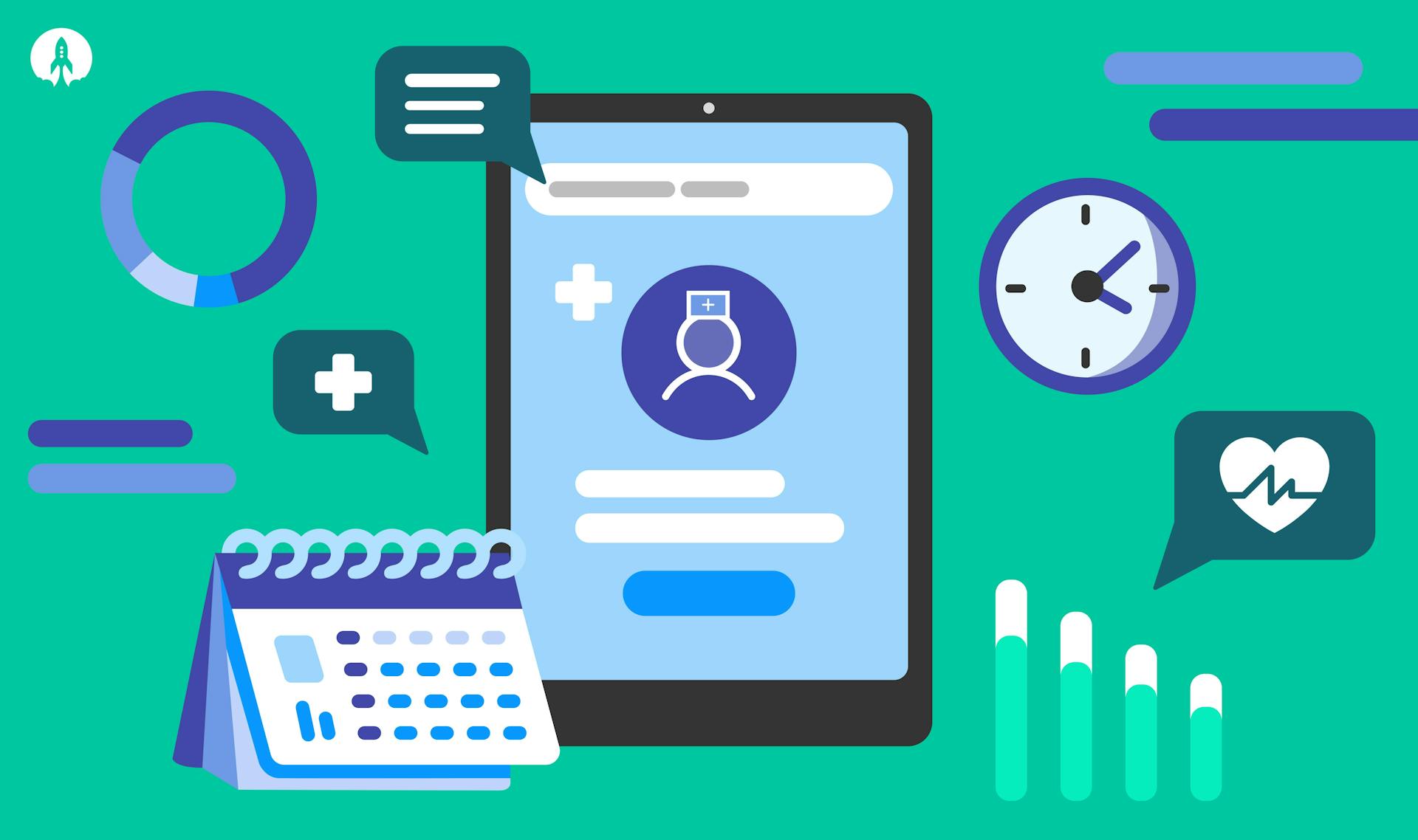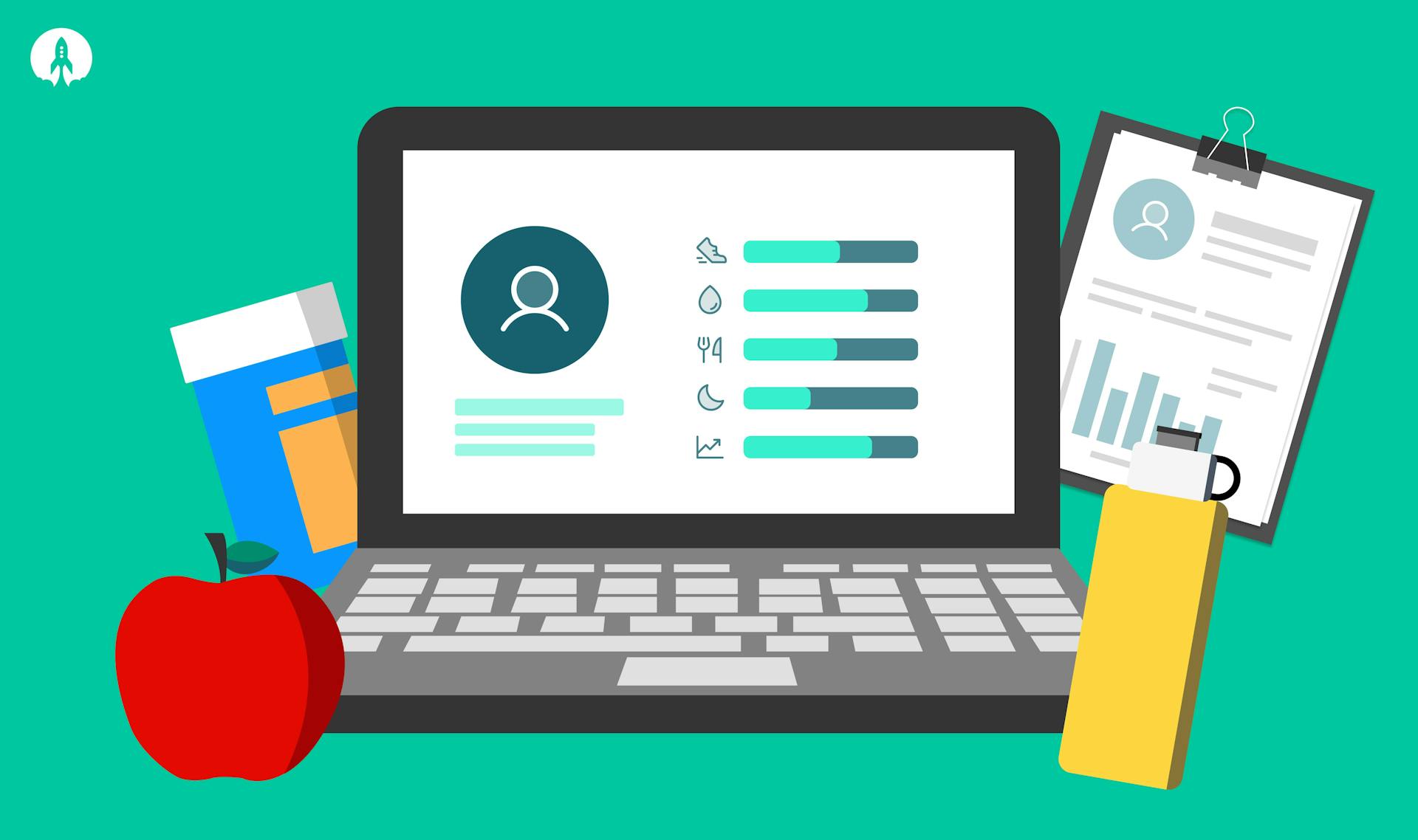Redefining Health And Wellness: Your Health Tech Guide For 2024

As technology continues to revolutionise all industries, healthcare and wellness is certainly no exception. Over the years, we have seen and contributed to the continued development of technologies within the healthcare sector.
With the help of specialised external software development companies like ours, healthcare providers have improved health services and saved lives in incredible ways.
While growth within the health tech sector has progressed steadily year upon year, the COVID-19 pandemic was a significant catalyst in developing and adopting technology and innovative software within the sector. With an expected CAGR of almost 25% from 2019 to 2025, the market is projected to reach nearly $660 billion in 2025.
It's not only medical technology that has improved by leaps and bounds; a new field that involves the development of digital health and wellness solutions has also seen rapid growth.
Health and wellness is no longer a domain reserved only for healthcare professionals. Health tech is ingrained in our daily routines. Wearables are becoming increasingly common, and health apps like fitness trackers or meditation apps are very popular. In fact, almost two-thirds of US consumers used a health app in 2022.
For this reason, there has never been a better time to be in health tech. To help you understand the opportunities that the field offers, we’ve created a comprehensive guide on this market.
We'll explore what health tech is, its applications, and its benefits. Also, we'll delve into how we’ve created digital solutions that can help people live healthier lives.
What Is Health Tech?
Health tech, or digital health, uses technology to boost healthcare services and improve patient outcomes.
By merging healthcare with technology, it aims to improve patient care, tailor treatments, and boost physical and mental wellness.
Beyond medical technology, health tech offers digital tools for fitness and mental health monitoring, like activity trackers and virtual therapy platforms. The primary goal is to create a more efficient, personalised healthcare experience while promoting overall well-being and fitness.
The Health Technology Landscape
The health tech sector is a broad and rapidly growing field, and it encompasses a wide range of technologies that can be used to improve healthcare delivery and patient outcomes. Some of the major sectors within health tech include:
➡️Medical devices: The development and manufacture of a wide range of medical devices, such as implantable devices, imaging equipment, and surgical tools.
➡️Pharmaceuticals and biotechnology: This sector includes companies focused on drug discovery and the manufacturing of medicines, vaccines, and biologics.
➡️Digital health: This encompasses companies that create software and mobile apps for health and wellness enhancement, such as wearable tech, telemedicine platforms, and mental health applications.
➡️Healthcare IT: Companies in this sector provide software and systems that support healthcare delivery. This includes electronic health records (EHRs), patient portals, and clinical decision support systems for health professionals.
➡️Healthcare analytics: In this sector, artificial intelligence and machine learning are used to analyse medical data. Healthcare teams can use this data to improve the quality and efficiency of care and identify new treatments and cures.

Key Technologies and Innovations in Health Tech
Medical Technologies
🔸mHealth apps: Mobile apps can help with many health needs, from reminding you to take medicine to supporting mental health at home. Sony created mSafety for this purpose. It's a B2B platform that lets partners build and grow their health apps safely.
A Sony study found that 90% of people surveyed with chronic conditions believe a dedicated remote health device can help them manage their health better.
🔸Telemedicine platforms: These are online services that enable patients to consult with healthcare professionals remotely. A great example of this is Doxy.me, a telemedicine platform that lets doctors treat patients more easily.
🔸Wearables and IoT device software: Wearable devices like Fitbit and the Apple watch have become very popular, with about 1.1 billion connected wearable devices recorded worldwide in 2022. These wearables and their associated software monitor health metrics in real time or contain specialised tools like glucose monitors for people with diabetes.
🔸Electronic health records (EHR): Digital versions of patients' medical histories enable easy sharing and accessibility. Apps like Careful help doctors and healthcare workers to safely and easily share patient documentation.
🔸Artificial intelligence & machine learning: Here, algorithms assist in diagnoses, personalised treatment recommendations, and predictive analytics. This exciting tech has yielded some incredible results. In 2023, Moorfields Eye Hospital and UCL's Institute of Ophthalmology developed an AI model that spots biomarkers for serious eye diseases. It can also predict other health issues like heart attacks, strokes, and Parkinson's disease.
🔸Virtual reality (VR) & augmented reality (AR): Used in therapy or for medical training and patient education. Start-ups like Osso VR have made it possible for doctors to train whenever and wherever they need to.
🔸Blockchain: Enables secure patient data storage and exchange. BurstIQ, a blockchain-based platform, created a solution called Life Graph, which converts all your data into smart data.
🔸Robotic process automation (RPA): Automates repetitive tasks in the healthcare domain – like administrative tasks or patient scheduling – which makes the job of healthcare teams much easier. These digital products are already in use. Datametrics, for example, has a solution that automates and digitises the entire claims process, which ensures faster and more efficient handling of medical claims.
Sport and Nutrition Technologies
🔸Activity tracking: These apps track various health data, such as steps taken, distance travelled, calories burned, sleep quality, and heart rate. Along these lines, we created a fitness and health-tracking digital solution for the English Institute of Sport to help athletes achieve peak fitness.
🔸Workout guides: Provide exercise routines, video tutorials, challenges, and other features to help users stay motivated. Jefit offers an all-in-one solution for users to take control of their fitness.
🔸Calorie counters: Assist in tracking calorie intake and expenditure. NutraCheck allows users to search for the caloric counts of over 430,000 foods in the UK.
🔸Meal planners: Apps like Change4Life by the UK Department of Health and Social Care encourage users to improve their eating habits with meal plans, recipes, and other resources to help them reach their goals.
🔸Nutrient trackers: Monitor essential nutrients like protein, fat, and carbohydrate intake.
Mental Health Technologies
🔸Mindfulness and meditation: Focus on mindfulness exercises and guided meditation. A great example of this is Waking Up, a mindfulness and meditation app.
🔸Therapy and counselling: Offer virtual chat or video sessions with licensed therapists. A popular therapy platform is Better Help.
🔸Mood trackers: Help you record and analyse your mood over time. Mood Fit provides a customisable set of tools to help users track and improve their mood.
🔸Peer support: Platforms for sharing and seeking advice from a community of individuals with similar concerns. We worked on a similar product called Hearts & Minds – a platform to connect new mums.
🔸Sleep trackers: Monitor sleep cycles and quality. An innovative product called the Oura smart ring offers a stylish way to track your sleep patterns.
🔸Corporate wellness: As business organisations recognise the importance of employee well-being, many are turning to tech platforms that offer corporate wellness programs. These provide employees with health challenges, mindfulness exercises, or mental health resources. Yumuuv is one such platform that helps organisations create wellness challenges tailored to their specific needs.

Benefits of Health and Wellness Tech
So, now that you have more of an idea of what health tech is and saw some examples of the incredible ways in which this technology is revolutionising the industry, let’s look at the benefits.
✨Improved Quality of Care
The use of technology in healthcare is ultimately improving the overall quality of patient care in a myriad of ways. Some examples include:
➡️Reducing medical errors and oversights
➡️Enhancing research and development
➡️Increasing patients’ safety
➡️Contributing to disease prevention
➡️Providing remote patient support
➡️Diagnosing illnesses more efficiently
➡️Providing valuable health data
➡️Improving communication between patient and provider
✨Convenience and Accessibility
One of the most significant issues that surfaced during the COVID-19 pandemic was the lack of resources. Health technologies like telemedicine have mitigated this issue and expanded patient access.
Now, patients can book video consultations with medical professionals or social care providers to get the care they need.
These online technologies make health services convenient and accessible to remote and underserved communities.
✨Enhanced Efficiency
Advancements in medical technology have brought about numerous improvements in the efficiency of healthcare systems, delivery, and patient outcomes. Here's how:
✔️Streamlined administrative tasks: Electronic health records (EHRs) cut paperwork by simplifying patient data management.
✔️Predictive analytics: Analyses data to anticipate patient needs and reduce wait times
✔️Remote monitoring: Wearables track real-time health data, which reduces regular checkups.
✔️AI diagnostics: Machine learning provides fast and accurate medical analyses.
✔️Robot surgery: Robots assist surgeons with precise, quicker surgeries and faster recovery.
✔️Automated communication: Patients receive reminders for meds and appointments, which improves drug uptake and adherence.
✔️Digital therapeutics: Apps offer consistent treatment tools and limit constant visits to the doctor.
✔️Resource optimisation: Health technologies optimise hospital resource allocation based on current demands.
In essence, health tech allows healthcare settings and individuals to do more with less. Some examples include relieving staff of labour-intensive, manual tasks, helping to reduce burnout among highly pressured frontline staff, and focusing valuable human time on high-priority tasks.
✨Personal Empowerment
As mentioned above, digital health products – particularly wearables and health-focused apps – transform how individuals engage with their health.
These tools promote self-awareness and empower people with real-time data, which allow them to make informed decisions about their well-being.
As patients harness the insights from these devices, they can detect symptoms earlier, better manage chronic conditions, and collaborate more effectively with health professionals. Fitness tracking and wellness apps also signal a shift towards proactive health management.
With health tech technology continually advancing and the sector predicted to reach a valuation of $504.4 billion by 2025, we can anticipate even greater empowerment for individuals and expect unprecedented improvements in healthcare quality and efficiency – at a time when it’s needed the most.
✨Cost Savings
Investing in health tech might initially seem costly, but it will reduce healthcare costs in the long run. For example, staffing costs can be reduced by streamlining processes and cutting down on admin tasks.
Patients also save, as they don't need to visit doctors as often, which cuts down their travel costs and fees. Tools like remote patient monitoring mean shorter hospital stays and fewer return visits.
In short, health tech is not just advanced – it's cost-effective.
✨Enhanced Medical Research
The digital health realm's data-rich nature provides invaluable patient data from diverse populations, which propels clinical research.
Health apps and wearables offer real-world insights and paint a more holistic, real-life picture that transcends the confines of clinical settings.
Additionally, digital platforms have streamlined clinical trial recruitment, which makes the process swifter and more efficient.
✨Community Building and Support
The digital age has heralded the rise of online patient communities, havens for peer support, and medical knowledge exchange.
Gamified wellness challenges introduce an element of fun, which spurs community engagement, while platforms that connect patients with similar health journeys promote shared experiences and coping strategies.
Health Tech Software Products
Software lies at the core of the rapidly evolving landscape of health tech. With many applications, it's a space ripe with opportunities, not just for established businesses but also for budding start-ups.
Here at Rocketmakers, health tech is more than just a trend – it's a major focus area for us. Dive into the examples below to get a glimpse of some exciting projects we've had the privilege to work on.
🚀Electronic Health Records (EHR)
These digital systems have replaced traditional patient paper charts and allow real-time, patient-centred records to be shared among authorised users instantly. They streamline and automate workflow, and with features like patient history, diagnoses, medications, and treatment plans, they've become invaluable in clinical settings. We worked with Careful to create an app to help doctors share and protect critical patient data.
🚀mHealth Apps
Mobile health applications span a broad range, from medication reminders and symptom trackers – like the one we developed for Ineos – to mental health support and wellbeing platforms like Wavesix.
These apps put healthcare management and wellness into the hands of patients, which allows them to be more proactive about their health.
The opportunities are limitless. We even created a pet well-being platform called Biscuit!
🚀Peer Support Platforms
Digital platforms that connect individuals with similar health conditions allow them to share experiences and advice, and offer mutual support.
A great example of this is Hearts & Minds, a platform we created to help connect new mums with mental health support groups.
💡Want to explore more? Look at some of the projects we’ve worked on here.
👋We’re Rocketmakers: Experts in HealthTech
Our ultimate goal as an award-winning software agency is to positively impact the lives of 50 million people over the course of a decade through the software we build. Given this, it's no surprise that many of the projects we've worked on focused on improving physical and mental health through leading software solutions.



